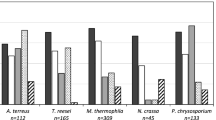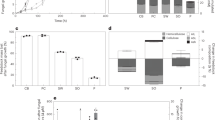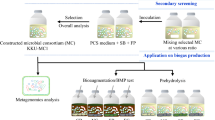Abstract
IT is a well-known fact that by the combined action of cellulose-decomposing and nitrogen-fixing bacteria in crude culture, elementary nitrogen may be fixed in quantities of as much as 10–12 mgm. per gm. of decomposed cellulose. So far, only Vartiovaara1 seems to have given indisputable proof of nitrogen-fixation in combined cultures of one nitrogen-fixing and one cellulose-decomposing organism (Azotobacter; Clostridium pasteurianum, cellulose-decomposing fungi).
This is a preview of subscription content, access via your institution
Access options
Subscribe to this journal
Receive 51 print issues and online access
$199.00 per year
only $3.90 per issue
Buy this article
- Purchase on Springer Link
- Instant access to full article PDF
Prices may be subject to local taxes which are calculated during checkout
Similar content being viewed by others
References
Vartiovaara, U., J. Sci. Agr. Soc. Finland, 10, 241–264 (1938).
Jensen, H. L., Proc. Linn. Soc. N.S.W. (in the Press).
Jensen, H. L., Proc. Linn. Soc. N.S.W., 65, 1–122 (1940).
Author information
Authors and Affiliations
Rights and permissions
About this article
Cite this article
JENSEN, H., SWABY, R. Association between Nitrogen-fixing and Cellulose-decomposing Microorganisms. Nature 147, 147–148 (1941). https://doi.org/10.1038/147147a0
Issue Date:
DOI: https://doi.org/10.1038/147147a0
This article is cited by
Comments
By submitting a comment you agree to abide by our Terms and Community Guidelines. If you find something abusive or that does not comply with our terms or guidelines please flag it as inappropriate.



